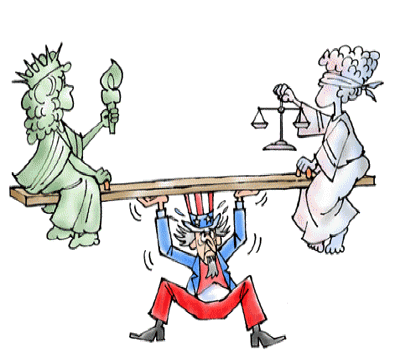Why Republican?
What would a Liberal Republican policy platform look like? And why do I regard myself, and so many Americans I know, as Liberal Republicans rather than as moderate Democrats?
For many of us who regard ourselves as somewhere in the middle politically, I believe that there are two major issues that separate most who would identify as Republicans from those who would identify as Democrats. The first is whether we regard the government or the private sector as more capable of handling most problems, with Republicans generally arguing for private sector solutions and Democrats leaning to government ones. I identify as a Liberal Republican because I believe that good public education and public safety (national defense and domestic policing and incarceration) are best handled by the government, but most else, like housing and job creation, are better handled by the private sector. I believe that government regulation is important, but should be simple, clear and enforceable. Regulation that provides a feeding frenzy for lawyers and lobbyists is highly problematic and often counterproductive. I also believe that those guilty of violating laws should be more severely punished, in a manner commensurate with the harm created by their deeds. (This is rarely true in America today for "white collar" crime.) In contrast to these Liberal Republican views, my Democrat friends are much more likely to be suspicious of business, and see the government as having a much bigger role in an ideal society, such as providing housing and jobs and regulating comprehensively and heavily.
The second issue that separates those of us who are somewhere in the political middle but regard ourselves ideologically as Liberal Republicans rather than as Democrats is what we mean when we advocate for equality. Do we mean equality of opportunity with a strong social safety net (a liberal Republican view), or do we mean relative equality of where we all end up economically (the traditional social democratic view)?
While it is commonplace to say that America is the land of broad opportunity, this has been changing in America for a while now. That is a tragedy. The data increasingly demonstrates that we are now doing a poor job as a nation of providing clear paths to upward mobility. This is in part because of things like globalization and technology, but also in part because we have had few effective government strategies to promote upward mobility. And one of the reasons we have few effective strategies, in addition to our gridlocked government, is the muddled mess most of our politicians make of the issue. For example, President Obama's 2013 Osawatomie, Kansas speech beautifully focused on equality of opportunity rather than equality of results. But the conversation quickly shifted to talking about the one percenters, which is much more about equality of result than equality of opportunity. A LOT more Americans will support proactive government policies that are laser focused on equality of opportunity than policies that seek to achieve equality of result. After all, part of the American Dream can be summarized in the famous quote, "Socialism never took root in America because the poor see themselves not as an exploited proletariat but as temporarily embarrassed millionaires."
Over a billion additional people around the world are now living lives that resemble variations of our consumer-oriented, middle class society. This is the first time in history many have had the opportunity to affect their and their family's futures so materially, relatively unencumbered by a repressive government or by their own beliefs that it is their fate to live the impoverished life they were born to. Billions more aspire to lead such lives and are studying and working very, very hard towards such goals. That's a lot of energy out there around the globe, with more countries joining this club every decade.
This happy change towards American Dream self-help values around the world is to be celebrated. But it also limits America's policy options in ways that make a Liberal Republican focus on equality of opportunity with a strong safety net much more achievable than the social democratic policies that prevail in much of Western Europe and are supported by many in the Democratic Party today.


